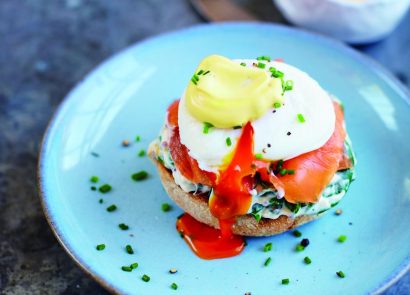The caffeine-obsessed among us will agree that if there’s one thing worth waking up for, it’s a cup of coffee in the morning. And, whatever your motivations are for a daily trip to Costa on your way to work, we’ll bet it’s not to leverage your health, right? Well, coffee might be more nutritionally sound than you think. Despite its bad rep, coffee actually has some credible health benefits, with some studies suggesting that it can improve memory, reduce cancer risk and even help you live longer, but before you guzzle down another latte, the road to coffee-induced bliss is a little bumpy. Buzzing for the intel? Our panel of experts chime in on this heated debate and answer all your coffee FAQs like ‘am I addicted, how much is too much and are there any alternatives?’ Cue the caffeine…
The daily grind
There’s no denying that coffee has become a staple in our routines (some claim they can’t function without one in the morning) and, you’ll probably find yourself in the minority if you’re one of those people who don’t make a beeline for the kettle first thing. In fact, recent research* has shown that coffee ties with tea as our favourite hot beverage, with 95 million cups being consumed every day in British households. So, why the uptick? Alex Manos, one of the few Institute for Functional Medicine-certified practitioners in the UK and chief wellness officer for Exhale Coffee (exhalecoffee.com), thinks its power to bring people together plays a big part. “I think the smell and aroma of coffee is sometimes more appealing than the taste, and it can also evoke romantic images of socialising and old associations,” he says. “For example, my dad is a coffee lover and I have memories of walking into the kitchen and being greeted with the smell of coffee.”
Let’s not forget the array of immediate impacts that makes you want to pop the kettle on too. “The caffeine content of coffee is a known stimulant of your central nervous system, [which is why] after drinking coffee, you typically feel more alert and less tired,” explains Dr Nirusa Kumaran, medical director and founder of Elemental Health Clinic (elementalhealthclinic.com). Get the jitters immediately after a cup? You might be sensitive to the impacts of caffeine – and your genes could be partly to blame, she continues. “Genetics can render people more sensitive to coffee. There are epigenetic SNPs, or single nucleotide polymorphisms, that have been shown to either slow your metabolism of coffee or stop you from eliminating it from your body.” This could explain why some people can drink three flat whites no problem, but others feel jittery after a few sips. As a general rule, Dr Kumaran says you should avoid excess caffeine if you’re pregnant or breast feeding, as high amounts of caffeine have been linked to potential problems with the baby’s growth and development.
Spill the beans
You may be inclined to think that just because you love your coffee, it can’t be doing you much good, but coffee can be one of the best health drinks out there – it comes with some steaming-hot mental and physical benefits, which have been extensively researched. Alex says that regular coffee drinkers have been shown to have a 30 percent reduction in mortality from stroke, a 29 percent lower risk of non-alcoholic fatty liver disease, an improvement in blood pressure and a 25 percent reduced risk of Type 2 diabetes. Coffee is full of antioxidant nutrients too which, Dr Kumaran says, are important to mop up free radicals and reverse the effects of oxidative stress, which can be damaging to our DNA and cells. Its ability to improve cognitive performance also gets a shoutout, as it could play a role in neurodegenerative diseases, such as Alzheimer’s and Parkinsons. Pretty impressive resumé, right?
Coffee without the crash
What about those who can’t have caffeine? “Decaffeinated coffee still contains a very small amount of caffeine (around three percent compared to regular coffee, so approximately 3mg vs 95mg per cup),” says naturopathic clinical nutritionist, Lara Hughes (wholistic-health.co.uk). “The process of decaffeination involves various options, but most commonly, the beans are soaked in a chemical solvent (usually methylene chloride or ethyl acetate) to remove the caffeine; while this might be music to the ears of those sensitive to the side effects of caffeine, the same process removes a majority of the natural, bioactive compounds such as antioxidants in coffee which would usually confer health benefits.”
Coffee companies that have a more natural process of decaffeination are few and far between, Lara tells us. She recommends the Organic Everyday Decaf Tea from Clipper Tea that uses carbon dioxide and water in the decaffeination process. Need a boost without the shakes? Green tea is a great option. “Green tea contains caffeine and also the nervous system-calming amino acid L-Theanine, which promotes focus and attention but in a calming manner minus the jitters. Apoptogenic mushrooms are also a great substitute,” says Lara. Think your cup needs an extra kick? Nespresso has launched a new functional coffee range that contains 20 percent more caffeine than its regular blends, designed to help coffee lovers be ready to face their day. Visit nespresso.com for more information.
Dark roasting
Three to five cups of coffee were the general consensus among our experts as the sweet spot to reap those delicious benefits, but if you fall into one of the caffeine sensitive camps, that might be too much for you. So, time for the moment of truth. How much is too much? The best way to assess this is to monitor a few signals from your body, advises Dr Kumaran. “When you start seeing signs of irritability, agitation, a racing heart rate, high blood pressure, anxiety, headaches on caffeine withdrawal (or are struggling with stress or insomnia) then it’s best to limit caffeine. The maximum recommended daily dose of caffeine is 400mg, which is typically four or five cups of coffee depending on the strength of the coffee itself.”
If you’re knocking back more than the amount recommended by the experts, you may be addicted to the caffeine, rather than the coffee itself. This can be characterised by: “A persistent desire or unsuccessful efforts to cut down or control caffeine use, continued caffeine use despite knowledge of having a persistent or recurrent physical or psychological problem that’s likely to have been caused or exacerbated by caffeine, withdrawal symptoms of caffeine such as headaches, and irritability and craving or a strong desire or urge to use caffeine,” explains Alex. Caffeine withdrawal is also recognised medical condition, so if you’re experiencing symptoms, such as headaches, irritability, fatigue, difficulty concentration or depressed mood after quitting caffeine, seek help from a professional.
Order up
Love the ritual of heading to your favourite coffee shop on the weekends? You’re not alone. A survey of 4,000 consumers by Allegra revealed that going to coffee shops came second after seeing friends and family as the most-missed social activity since coronavirus lockdown began. Now that we’ve seen the back of café closures – and if you’re looking to hack your morning mug – Dr Kumaran recommends aiming for organic coffee where possible. “Organic coffee is likely to have much more antioxidant nutrients compared to nonorganic. It’s best to avoid a dark roast as this may reduce antioxidant nutrient levels, and aim to avoid sweetened lattes that may have a high fat or sugar content.”
If you prefer having your coffee at home, Alex agrees that a light or medium roast is better, but to go one step further, look for the speciality grades. “This means the beans have been better looked after right from the start of their lives. So, they’ll have been grown on a healthier plant, with less risk of contamination during handling and roasted with more care, so less likely to be dark roasted (keeping more nutrients in), leading to an altogether healthier cup of coffee.”
The bottom line? Coffee is to be enjoyed – and we’re advocates for doing more of the things that bring you joy – but it’s also good to know that you’re in control of your preference of this glorious morning beverage and how it can have an effect on your health and happiness.



















